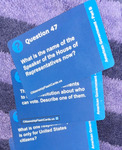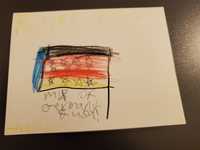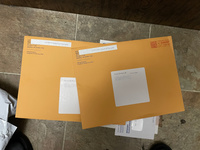 |
| Angelika/Mike Schilli |
|
|
|
Angelika On February 7th, we had our interviews at the Immigration Office in San Francisco, two hours apart. Michael's was at 12:30pm and mine was at 2:30pm. By the way, it's not the norm for married couples to go to the interview on the same day, but we were lucky in that regard. When it was my turn, Michael had already finished his interview and passed the citizenship test. We met on the street in front of the building, and Michael was able to give me some quick tips. As usual, he had to retrieve his small pocket knife from a flower pot around the corner, since you weren't allowed to bring a knife, no matter how small, into the building, since we all had to go through a security check and a metal detector. What I've already gone through with Michael and his knives in the wrong place could fill a lot of pages. But I digress.
Due to the coronavirus restrictions, we were only allowed to enter the building 15 minutes before our appointments. The security check went quickly. Nowadays you can also take your phone into the building. That was different with our green card back then. First I showed my letter with the appointment at the registration desk. Then I was sent to a waiting area where several people were already seated. Pretty soon a friendly lady called me, who looked at my German passport and my green card. Then she took me to a room with a desk. But there was no person sitting at the desk, just an iPad! Yes, you've read that correctly. I probably looked a bit stupid, but Michael had warned me beforehand that the interview would take place virtually. By the way, not only because of Covid, as the official who conducted the interview later explained to me, but also to be more efficient. This way the interviewers can sit in other places. Mine was in Los Angeles.
The lady who had led me to the office first activated the iPad and the officer appeared on the screen and introduced himself. I held up my California driver's license to the iPad to identify myself and then had to swear with my right hand raised to tell the truth. Initially, the officer exchanged a few pleasantries with me. Standardly, they also ask if the person being interviewed needs a translator, which I always find particularly nice since we had been speaking in English the whole time. The officer then informed me that I didn't need to take the reading and writing test due to my age. Hmmm. The test is really easy though. You just have to write down an English sentence that the officer reads out loud and then you need to read out loud a sentence printed on the screen. Here's an example: Read: "What do we pay the government?" Write: "We pay taxes."
At first, I was immediately asked some citizenship questions. There is a publicly known catalog with 100 questions that deals with the history of the USA, the structure of the U.S. government and important constitutional principles, as well as the rights and duties of American citizens. During the interview, then candidate has to answer ten random questions from the catalog. Six out of ten questions must be answered correctly, then you have passed the test. If you manage to answer six questions correctly in a row, the remaining four questions won't be asked.
Not only the questions but the answers are standardized. Which is why it's wise to provide the previously learned answers verbatim and not embellish them. There's a story about an applicant who failed the test because she was a specialist regarding Martin Luther King and gave the officer a long lecture. But he only wanted to hear the short answer "Martin Luther King". Which is why there's all kinds of publically available helper material to prepare for the test. From classic pre-printed flashcards to a smartphone app with the test questions. Even if some questions are easy to answer, such as what is the name of the president of the USA, there are others that we had to memorize, especially some important dates, such as when the American Constitution was written. Weeks before the interview we quizzed each other with questions from the flashcards, or we practiced individually with the app. Here are the questions I had to answer. Well, would you have known the answers?
* What does the Constitution stand for? It sets up the government, defines the government, and protects the basic rights of Americans.
* What ocean is on the East Coast of the United States? The Atlantic Ocean.
* What is the capitol of your state? Sacramento
* There were 13 original colonies. Name 3. North Carolina, Virginia, Maryland.
* Name one right only for United States citizens. To vote in a federal election.
* Who was President during the Great Depression and World War II? Franklin Roosevelt
As luck would have it, we didn't have to learn 128 questions and their corresponding answers. When Trump was president, he thought that the question catalog with 100 questions was too easy and decided on the spot that from the end of 2020, an additional 12 out of 20 questions from the new, more extensive question catalog would have to be answered correctly in order to become a citizen. However, President Biden rolled this back, which was to our benefit. I would like to know if Trump would pass the test at all. A study from 2018 found that only 36% of Americans would manage it. By the way, I did the test for fun with my students at the school and they passed it easily.
After the test, the officer went through my application with me and rechecked some questions from the application. This is done to determine if the applicant filled out the application themselves and truthfully. The officer asked me questions such as where I work and what I do exactly, if I am married, what my husband does for a living, if I have always filed a tax return, or what clubs or other associations I am a member of. And: What was the traffic offense exactly I did get a ticket for? This may surprise you now, but one question on the application was: "Have you ever been arrested, cited, or detained by any law enforcement officer (including any immigration official or any official of the U.S. armed forces) for any reason?"
On internet forums there are long debates about this question, because many people want to know if they have to disclose traffic offenses such as speeding or similar. But the book we bought on the topic of American citizenship from the renowned publisher "Nolo" which specializes in legal topics advised us to do so. I had once turned left where I wasn't supposed to and Michael had once not stopped correctly at a red light before making a permitted right turn. Both of us had received a traffic ticket and paid for it. In our interviews our respective officers briefly asked what it was about and what kind of traffic offense it was, but then the matter was settled. By the way, you don't have to disclose parking tickets. That would probably be too much. Michael also had to give information about his time in the German Army. Here is the question from the application: "Did you ever receive any type of military, paramilitary, or weapons training?"
After I had told my officer that Michael had already finished his interview and was to be sworn in at 3pm, he tried with all his might to get me into the afternoon ceremony and speed up the interview. He then said something flippantly that he would skip the Nazi question because I hadn't been born yet at that time. The question from the catalog is about whether the applicant was part of the Nazi regime between March 23, 1933 and May 8, 1945. Also, we both also had to say whether, when and for how long we had been out of the country after applying for citizenship, for example for visits to Germany. My officer also wanted to know why we had waited so long to apply for citizenship. I answered somewhat vaguely and he already printed out the form confirming that I had passed and was allowed to be sworn in. Unfortunately, I didn't make it to the 3pm event because it was already fully booked.
It was funny that Michael had a new photo taken for his naturalization certificate during the interview, but not me. This initially worried me because I thought they had forgotten about it in the rush. It turned out, however, that my ten-year-old green card photo, which was stored in the system, was still good enough. So I must have kept myself well. By the way, people on various internet forums always advise to take additional things to the interview, from passport photos to tax returns. But that's all nonsense. On the invitation to the interview it was clearly listed what to bring and we did not need more: invitation to the interview, green card and passports with all entry stamps into the USA. I also brought all expired passports with the stamps, but nobody wanted to see them, only the valid German passport.
I then waited for Michael. And after the obligatory souvenir photo, we went out to celebrate a bit, namely to the restaurant "Coqueta" at the Embarcadero by the water, where we sat outside in the bright sunshine and sipped champagne. Living the high life!













